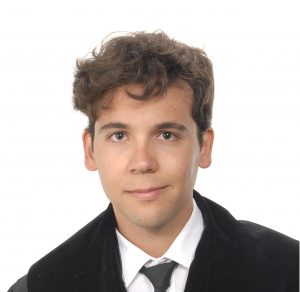Christian Sabater is a 24 years old Aerospace Engineer who works as a PhD researcher in the German Aerospace Laboratory. Coming from a coastal village in the Mediterranean Sea, Christian loves kayaking and sailing, but his real passion lies in the sky. His research focuses on the optimization of the aircraft wing taking into account the uncertainty of the operational conditions and manufacturing tolerances. As a part of the UTOPIAE network he is combining state of the art numerical models with new optimization routines and uncertainty quantification. His long-term goal is to bring together academia with industry, in order to come up with innovative ideas that will increase sustainability globally. Christian believes that in order to make his goal true, it is necessary commitment, hard work and out of the-box thinking.
Aerospace Laboratory. Coming from a coastal village in the Mediterranean Sea, Christian loves kayaking and sailing, but his real passion lies in the sky. His research focuses on the optimization of the aircraft wing taking into account the uncertainty of the operational conditions and manufacturing tolerances. As a part of the UTOPIAE network he is combining state of the art numerical models with new optimization routines and uncertainty quantification. His long-term goal is to bring together academia with industry, in order to come up with innovative ideas that will increase sustainability globally. Christian believes that in order to make his goal true, it is necessary commitment, hard work and out of the-box thinking.
Christian completed a Bachelor of Aerospace Engineering in the Polytechnic University of Valencia. He spent his fourth year studying abroad in Florida, in Embry-Riddle Aeronautical University. There, he performed wind tunnel experiments of a novel UAV configuration and worked part-time as a research assistant investigating aircraft accidents through the analysis of black box data. He found really useful the unique hands-on approach typical from American Universities.
After his Bachelor, Christian was awarded a research scholarship from Nanyang Technological University, in Singapore to investigate the joined-wing aircraft trough Computational Fluid Dynamics. Looking to further develop and learn at a university that promotes innovation, he started his Master studies in Aerospace Engineering in TU Delft, the Netherlands. Among other courses he enjoyed Multidisciplinary Design Optimization and Aircraft Performance Optimization.
As a part of his studies, Christian undertook a five months internship in EXSYN Aviation, an aerospace consultancy based in Schiphol Airport, Amsterdam. He implemented a repeatable data mining process that can be used by airliners to give insight about their fleet component reliability. The application he developed has been presented in several international conferences and will be released as a part of a larger solution.
Motivated by his passion in aircraft aerodynamics, Christian completed his Master Thesis in the German-Dutch Wind Tunnels (DNW). He investigated external flow effects in the engine/airframe integration testing technique by combining analytical, numerical and experimental methods. Among other projects, he was in charge of the design, planning and execution of a wind tunnel test to simulate the interaction of the wing with the turbofan exhaust. What he finds most exciting is the complexity of the interference effects and continuous trade-offs in aerodynamic design that, if understood, will lead towards optimized configurations.
In his free time Christian enjoys reading historical novels and cooking together with friends, but his real passion is travelling. While abroad, he has acquired a broad perspective regarding the future challenges of the aerospace industry. After living in five countries in five years, he is looking forward to be part of a multicultural team of researchers, bringing together innovative ideas that will lead to a more sustainable aviation.
Research output:
C. Sabater, P. Congedo, O. Le Maitre, S. Görtz. “A Bayesian Approach for Quantile Optimization Problems with High-Dimensional Uncertainty Sources”. CMAME Journal. (Submitted)
C. Sabater, P. Bekemeyer, S. Görtz. “Efficient Bi-Level Surrogate Approach for Optimization under Uncertainty of Shock Control Bumps”, AIAA Journal, 2020
C. Sabater, S. Görtz. “Robustness Enhancement of Transonic Aircraft through the Optimization under Uncertainty of Shock Control Bumps”, ICAS 2021: (Accepted for conference)
C. Sabater, P. Bekemeyer S. Görtz. “Robust Design of Transonic Natural Laminar Flow Wings under Environmental and Operational Uncertainties”, AIAA SciTech 2021 – Virtual (Accepted for publication)
C. Sabater “Optimization under Uncertainty of Shock Control Bumps for Transonic Wings”, UQOP 2020. (Accepted for conference)
C. Sabater, S. Görtz. An Efficient Bi-Level Surrogate Approach for Optimization under Uncertainty of Shock Control Bumps”, AIAA Sci Tech 2019, San Diego
C. Sabater, S. Görtz. “Gradient-Based Robust Design using the Adjoint Method and Gaussian Processes”. In “Advances in Evolutionary and Deterministic Methods for Design, Optimization and Control in Engineering and Sciences”, edited by Antonio Gaspar-Cunha et. al. Springer 2020 (Accepted for publication)
C. Sabater, “Best Practices for Surrogate Based Uncertainty Quantification in Aerodynamics and Application to Robust Shape Optimization”. In “Optimization Under Uncertainty with Applications to Aerospace Engineering”, edited by Massimiliano Vasile. Springer 2020 (Accepted for publication).
C. Sabater, O. P. Le Maître, P. M. Congedo. “Optimization under Large Number of Uncertainties using Quantile Bayesian Regression”. Uncertainty Quantification & Optimization Conference (UQOP), Sorbonne University, Paris, France, 18-20 March 2019
C.Sabater. “Probabilistic Characterization of Operational Uncertainties in Transport Aircraft using OpenSky Surveillance Data”. 8th OpenSky Symposium, 12-13 November 2020, Brussels, Belgium
C. Sabater, P. Bekemeyer. “Robust Design of Natural Laminar Flow Wings”. 20th ONERA-DLR Aerospace Symposium (ODAS 2020)
C. Sabater, S. Görtz. “Introducing Efficient Surrogate Based Methods for the Robust Design of Shock Control Bumps”. 5th International Workshop on Optimization in Space Engineering (OSE5), 21-22 November 2019, Ljubljana
C. Sabater, S. Görtz. “From Multi-Point to Robust: Optimization under Uncertainty of Shock Control Bumps for Transonic Wings”. Airbus DiPaRT 2019, Bristol, UK
